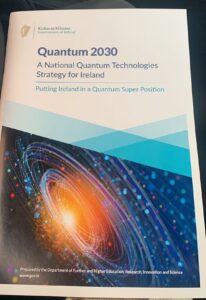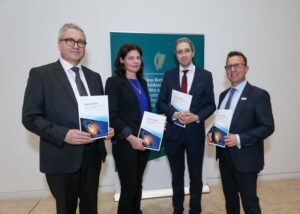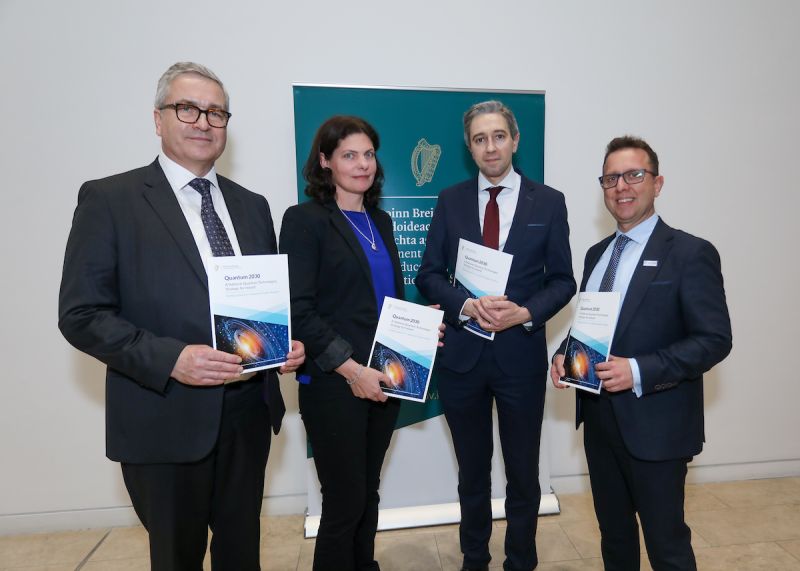Minister Harris announces Quantum 2030, Ireland’s first national strategy for quantum technologies
 Director of Research at Walton Institute at SETU and Co-PI of SFI Connect Centre, Dr. Deirdre Kilbane attended the announcement of Quantum 2030, Ireland’s first national strategy for quantum technologies, on 15th November 2023. The announcement was made by Minister Simon Harris TD, Department of Further and Higher Education, Research, Innovation and Science. In addition to Dr. Kilbane, other representatives of the IrelandQCI consortium of partners were in attendance – pictured are Georgios Fagas, Tyndall National Institute and Professor Jiri Vala, Maynooth University.
Director of Research at Walton Institute at SETU and Co-PI of SFI Connect Centre, Dr. Deirdre Kilbane attended the announcement of Quantum 2030, Ireland’s first national strategy for quantum technologies, on 15th November 2023. The announcement was made by Minister Simon Harris TD, Department of Further and Higher Education, Research, Innovation and Science. In addition to Dr. Kilbane, other representatives of the IrelandQCI consortium of partners were in attendance – pictured are Georgios Fagas, Tyndall National Institute and Professor Jiri Vala, Maynooth University.
Quantum computing is an area of computer science that uses the principles of quantum theory, which explains the behaviour of energy and material on the atomic and subatomic levels.
Quantum 2030 focuses the efforts of Ireland’s quantum technologies community on areas of emerging growth in quantum technologies where Ireland can achieve a competitive advantage.
Speaking today, Minister Harris said:
The publication of Quantum 2023 marks the adoption of its vision as a whole-of-Government policy goal.
“The strategy sets out a path for Ireland to be an internationally competitive hub for quantum technologies by 2030.”
Quantum computing application development activities in Ireland, both in academia and enterprise organisations, have been growing exponentially over the past three years.
 There has been a significant increase in the development of quantum computing applications that are important to enterprise end-users, public sector organisations and researchers.
There has been a significant increase in the development of quantum computing applications that are important to enterprise end-users, public sector organisations and researchers.
Consequently, organisations in Ireland across different sectors are investing in or seeking collaborative development of quantum computing solutions for their research or business services and solutions.
Irish researchers have also recognised the potential of Quantum technologies, for innovation and competitiveness.
Quantum computing has a long research tradition in Ireland documented by an impressive research output and international reputation.
This activity ranges from the development of key enabling technologies for quantum computer engineering to the actual realisation of quantum computing hardware and software, and transfer to applications.
Minister Harris added:
“Ireland has a strategically important position in the technology sector as a competitive global hub.
“We appreciate the synergy between the quantum training programmes offered by industry partners and those run through our universities.
“Together these programmes will prepare Ireland for the quantum revolution, providing us with a skilled workforce ready to apply breakthroughs in quantum computing to smart medical technology, telecommunications, climate change, and more.
“We believe Ireland can build on our existing successes in information and communication technologies to become a global leader in research, development and innovation that underpins the quantum revolution and to become the hub for realising and exploiting the new opportunities in quantum technologies, in particular in quantum computing and communications.”
Quantum 2030 is structured around four distinct pillars and one cross-cutting pillar. These are:
Pillar 1: Supporting excellent fundamental and applied quantum research
Internationally excellent research underpins advances in quantum technologies. This pillar focuses on strengthening work in Ireland in fundamental and applied quantum research to enable breakthrough discoveries and feed the pipeline of innovations and technologies.
Pillar 2: Nurturing top science and engineering talent
This pillar focuses on developing a pipeline of agile, innovative and highly skilled individuals across the spectrum of quantum science, engineering and technology.
Pillar 3: Strengthening national and international collaboration
The scale of the challenges and investment required to realise quantum technologies means that some projects are only feasible through large-scale national and international collaborations. Greater national and international collaboration will allow Ireland to contribute to and learn from large-scale projects and best practice in quantum technologies.
Pillar 4: Fostering innovation, entrepreneurship and economic competitiveness
This pillar seeks to stimulate innovation and entrepreneurship in quantum technologies and related areas, including in indigenous small and medium-sized enterprises (SMEs). It also aims to strengthen collaborative work between academia and enterprise.
Pillar 5: Building awareness of quantum technologies and real-world benefits
As quantum technologies are new and evolving at pace, it is important that we build awareness of quantum technologies and their real-world benefits across a broad range of stakeholders. The purpose of this pillar is to have a quantum-literate society that takes full advantage, for everyone, of the benefits quantum technologies can bring.
Read full press release:
See Minister Harris’s announcement:

